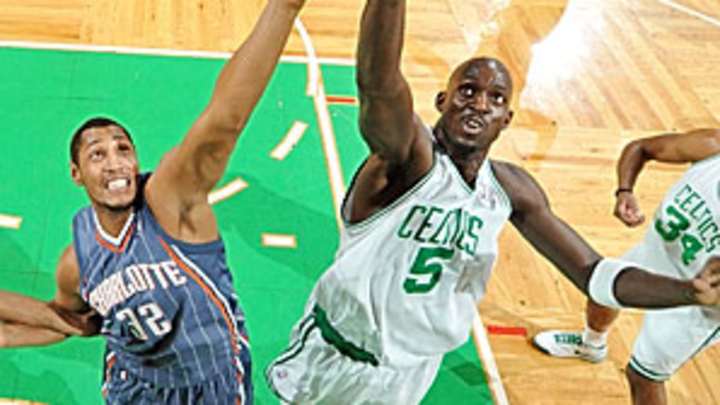C's rebounding goes by the board


It was one sequence among hundreds, but in many ways it exemplified the Celtics' entire season.
With Tuesday's game in New York tied and the clock winding down in the second quarter, Knicks guard Toney Douglas' layup attempt rolled off the rim. When the ball hit the floor, so did Douglas, who tapped the ball away from Kevin Garnett and Kendrick Perkins, among others. As Garnett watched the ball roll out of bounds, Knicks center Earl Barron hurled his body after it, tipping the leather to Douglas and giving New York an extra possession.
A Ray Allen foul and a Douglas free throw a few seconds later gave the Knicks a one-point lead going into halftime in their eventual 104-101 victory.
Of all of Boston's problems this season, the lack of rebounding is perhaps the most puzzling. In 2008, the Celtics won a championship with a top-10 rebounding unit. This season, with the same starting five and a sizable second unit fronted by Rasheed Wallace (6-foot-10, 225 pounds), Glen Davis (6-9, 289) and Shelden Williams (6-9, 250), Boston ranks 29th. In '07-08, Boston's rebounding differential was plus-3.1. Last season, it was plus-4.5. This season: minus-1.3.
Nearly everyone's numbers have declined. Garnett's drop-off has been the steepest, from a team-high 9.2 rebounds in the championship year to 7.4 now, his lowest mark since his rookie season. Paul Pierce (5.1 to 4.2) is down, and Wallace (4.0), Davis (3.8) and Tony Allen (2.6) haven't matched the '07-08 production of role players Leon Powe (4.1), P.J. Brown (3.8) and James Posey (4.4). According to Basketball Prospectus, Wallace this season is tied with Toni Kukoc in '05-06 for the third-lowest offensive rebound percentage (0.30) ever among regular players 6-11 or taller. Only Perkins, whose team-leading average of 7.6 rebounds is up from 6.1 two years ago, has had a significant rise in production.
"We don't get rebounds out of space like we used to," coach Doc Rivers said. "We've been beaten off the dribble so much that our bigs are in rotation more and that has hurt us rebounding."
Said Perkins: "I don't think it has to do with talent. It has more to do focus. It bothers me. At the end of the day, I can only do my job and go from there."
Rivers has tried different things to address the problem. After not emphasizing rebounding often in training camp ("We've been so good for so long that it wasn't our primary focus," Rivers said), the Celtics work on it regularly during practices. To protect the basket more, Rivers and assistant Tom Thibodeau have tinkered with the pick-and-roll defense to try to keep Boston's big men closer to the basket.
But one theory on the rebounding woes, one that passes the eye test, is that Boston isn't giving maximum effort on every possession. Active big men kill them: Cleveland's Anderson Varejao (9.0 rebounds against Boston), Atlanta's Al Horford (10.8) and New York's David Lee (12.8) gobble up everything. Against the Knicks, journeyman Barron pulled down a career-high 18 boards mostly by outworking Boston's stationary big men.
"They don't box out," said one player who faced the Celtics recently. "They jump and hope it comes to them."
And Boston's perimeter players often get caught flat-footed. Several times during last week's loss to Houston, Perkins growled at teammates for not picking up long rebounds.
"I just don't think it's an actual thought to go out there and go after every single shot," Williams said. "Guys kind of rely on other guys or expect the guy to make the shot. Guys just aren't crashing the boards. We have to make it more of a priority. We talk about it all the time. We can talk about it, but we actually have to do it, too."
With the playoffs fast approaching, Rivers acknowledges that the Celtics need a team effort to stay competitive on the glass.
"We have to be much better for us to have any chance of winning," Rivers said. "We force a lot of jump shots and a lot of those rebounds have been at the elbow. Unfortunately for the bigs, they are the ones who get the blame. [Guards] have to be responsible not just for the long rebounds, but also getting beat off the dribble. Everyone has to be better."
